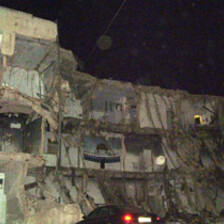Palestine Report 19 June 2005

Arafat’s destroyed compound in Ramallah following Israel’s April 2002 “Operation Defensive Shield”. The Muqata’ as the compound is known, is the Ramallah district headquarters of several Palestinian Authority offices and security forces. (Ronald de Hommel)
On June 4, dozens of attorneys refused to show up to courtrooms in the West Bank and Gaza Strip, in what they called a “one-day warning strike”. In a statement released by the Palestinian Bar Association, the lawyers said they were protesting assaults on what they described as “the three arms of justice”: the judges, public prosecuting attorneys, and defense lawyers. The statement decried legal professionals’ “unsafe working environment” blamed on increased vigilantism and the failure of the Palestinian Authority’s legislative and executive branches to protect the judicial system.
That day in the Nablus courthouse, lawyers halted all legal processes. Heated arguments broke out in the large hall where the protest was taking place as lawyers squabbled amongst each other – some demanded that the protest should be taken to the streets while others called on the police to provide security inside the courtrooms.
These problems are not limited to Nablus, and some say they are indicative of a general lawlessness and inefficiencies in the administration of justice in Palestinian society. And the litany of complaints is long.
Threatened judiciary
In an interview with the Palestine Report, head of the Nablus branch of the Bar Association Fawaz Saymeh outlined the most egregious.
“Lawyers are subjected to threats and judges are blackmailed. People cross the line with judges and lawyers, and the police do nothing. Our work environment is no longer safe because of the interference of armed groups who enter the courtrooms in order to influence deliberations. This has become commonplace in more than one Palestinian courtroom. Many people have lost faith in the judicial system and its ability to deal with legal disputes. Instead, they turn to gang members.”
Recent incidents cited by the Bar Association include one in which police allegedly prevented lawyers from entering the Nablus magistrate court on June 2. When lawyers protested, they were insulted and threatened by the policemen inside the courthouse. The same thing happened to lawyers in the Ramallah courthouse on June 1. In Nablus, on June 4, men armed with knives tried to stab one defendant but injured a policeman instead. Later that day, a number of armed men broke into a courtroom, went into a judge’s chambers and opened fire.
The Bar Association’s statement furthermore reported “repeated break-ins by armed men into courtrooms without any consideration for their sanctity. Such assaults have also affected the prosecution. This is happening in front of the police, which is responsible for maintaining law and order. But they do nothing to stop this.”
That was an accusation flatly denied by Nablus Police Chief Tariq Zeid. “Our policemen never stand by idly when there is disruption in the courts,” he told PR. Zeid also added that the police has never received any complaint from the courts of attorneys or lawyers being assaulted by armed men.
Vigilantism hindrance
“The repeated assaults on the judiciary results in the obstruction of the workings of the legal system, which should receive complete support and protection,” maintains Saymeh. “Unfortunately, this has not happened and it has forced us to protest and ring the warning bells.”
In April, three people, one armed with a pistol, raided a law office run by Judge Zuheir Bashtawi, a former deputy head of the higher appeals court in the West Bank. The men demanded that the judge and his assistant recuse themselves from the case of a certain Nablus resident.
Bashtawi’s, however, was not cowed. He and his aide, attorney Fawaz Al Bahsh, threw the three out of the office.
“I was shocked and insulted by the demand and by the threat,” Bashtawi told PR. “[And] that was when I finally understood how badly the status of the judiciary has deteriorated in our country.”
The veteran judge has fought hard to maintain his independent reputation and is a respected member of the legal community. Over the 50 year span of his career, he has served in a number of positions, including as Jerusalem’s attorney general in 1959. He was a magistrate judge, Jericho’s attorney general, and vice president of the appeals court between 1978 and 1980. He served vice president of the High Court of Justice from 1981 to 1982, and subsequently as head of the court of first instance in Nablus.
Bashtawi believes that the politicization of the judiciary, the resulting appointments of incompetent people, and the absence of a monitoring mechanism are all factors leading to the deterioration of the judicial system in the Palestinian territories. And in order to rectify the situation, on February 21 Bashtawi sent a letter to President Mahmoud Abbas that included 12 recommendations for the improvement of the judiciary’s performance.
Among these, he called on the president to reconsider all legislations approved by the Legislative Diwan, which gives final ratification for laws promulgated by the PLC, and urged a restructuring of the general prosecution office to be headed by a supreme court judge. He also called for the appointment of a decision-making body comprised of experienced senior judges who, in Bashtawi’s words, “only care for what is right”. To date, Bashtawi says he has not received any response from the president’s office regarding his letter.
Ray of hope?
A recent report issued by the Palestinian Independent Commission for Citizens’ Rights (PICCR) on the state of citizen’s rights during 2004 pointed to some improvements in the judicial authority, including the constitutional and smooth transfer of power following the death of President Yasser Arafat; the appointment of a head of the Court of First Instance; the establishment of magistrate courts in three cities; the consolidation of the PA’s financial sources; and efforts to raise the level of training. There was also the ratification of a package of laws including those to form regular courts, and the Basic Law of 2002, which, in particular, seeks the unification of the judicial systems in the West Bank and Gaza.
The report also pointed out that independent legal bodies have demanded the amendment of Articles 16 and 20 regarding the appointment of judges, their job descriptions and required qualifications, so that appointments no longer rest in the hands of the judicial authorities, as is the present practice that creates conflicts of interest.
PICCR’s report concluded that the reputation of the judiciary has been damaged due to “the growing phenomenon of a parallel judiciary and the interference of the executive authority and armed factions in the work of the judiciary. The lack of implementation of court rulings is also widespread, which has caused tremendous damage to the rights of complainants.”
A “parallel judiciary” refers to the existence of informal systems of justice, such as the tribal system, that people turn to rather than the official courts. Many citizens prefer to solve their problems through such informal means rather than to go to the civil or Sharia courts, because they believe that the tribal system maintains social ties and is faster and more effective than the civil courts.
Slow judicial machine
Speed and efficiency are not accusations that can be leveled at the civil courts. With a chronic lack of qualified judges – currently, 41 judges work 17 magistrate courts in the West Bank and Gaza – the speed of the legal system is notoriously slow. The Courts of First Instance suffer from the same problem with less than 50 judges serving 11 courts throughout the territories.
In addition, the Israeli-imposed closures on the territories during the Aqsa Intifada has had a huge effect, given that judges are forced to postpone cases because complainants and defendants are not able to reach the courts.
With so few judges, according to sources from the Bar Association, the legal process is also slowed by their heavy workload. At present, there are more than 16,000 cases being heard in the Nablus court system alone. In one day, one judge hears and average 40 to 45 cases.
The picture is replicated across the West Bank. As of November 24, there were 1,591 cases and complaints pending in the Qalqiliya magistrate court to be heard by one judge. In the Tulkarm magistrate court, 2,034 cases were due to be heard by two judges. And by the end of October 2004, there were 5,413 complaints and 950 cases for two judges to hear in Jenin.
Public opinion
The problems of the judicial system have caught the attention of a large sector of society and voices are being raised from many quarters for judicial reform.
Businessman Ziad Anabtawi from a Nablus businessmen’s guild said “internal security, the rule of law and the existence of an independent and dignified judiciary is the key to any economic revival, to encourage investment and for any business to flourish.”
On June 6, the Justice and Law Union bloc published a notice in Al Quds newspaper that condemned the spread of vigilantism that the judiciary is being subjected to, criticized judicial appointments “tinged by favoritism”, and called on President Abbas, the Cabinet, and the judicial authorities to immediately intervene to rectify the situation.
In his June 11 Al Ayyam column, meanwhile, Hani Al Masri wrote that societal reform begins with the reformation of the judiciary: “If the Palestinian judiciary is well, independent and protected and allowed to freely carry out its duties, then everything else will be well.”
But while efforts to address the problems are ongoing they also raise the passions.
A June 8 PLC session on judicial reform with Interior Minister Nasser Yousef simply turned into a session of finger-pointing and accusations among PLC members when concerns of security and vigilantism were discussed. It was after this meeting the Bar Association, which counts 1,900 attorneys as members, sent its report and a memo to the Ministry of Justice and the Higher Judicial Council demanding the judiciary be protected from, in the words of one attorney, “slaughter.”

Related Links





